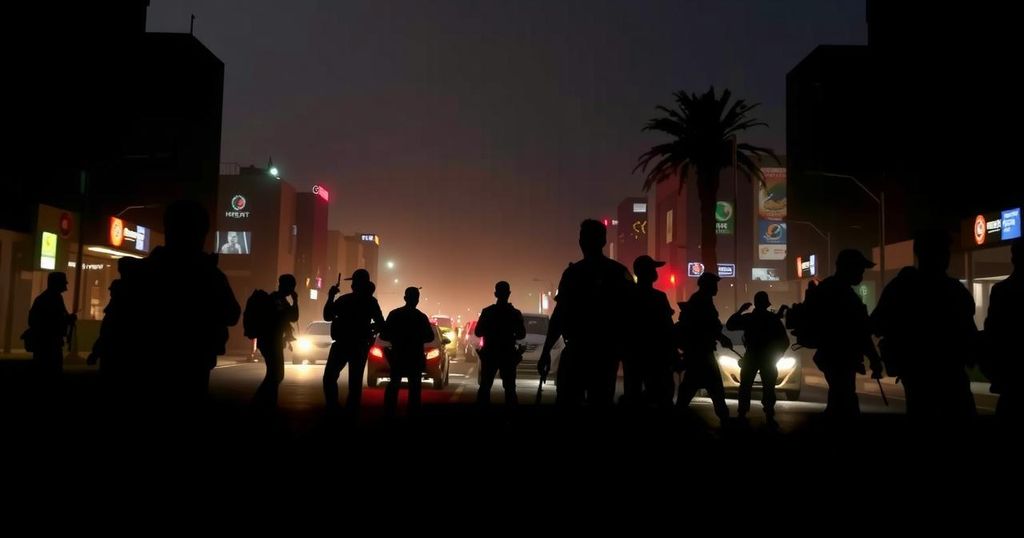Major Jihadist Attack in Bamako Leaves 70 Dead, Challenges Mali’s Security Strategy
A major jihadist assault in Bamako resulted in over 70 deaths and 200 injuries at a military site, revealing significant vulnerabilities in Mali’s security system. The attack, claimed by a group linked to al-Qaeda, raises serious questions about the junta’s stability and effectiveness, amidst ongoing tensions and strategic shifts following ties severed with France.
A significant assault occurred in Mali’s capital, Bamako, where an al Qaeda-affiliated group launched a coordinated attack on a military police training camp and the adjacent airport earlier this week, resulting in over 70 fatalities and more than 200 injuries, according to a Malian security source. This incident, one of the deadliest for security forces in recent years, raises concerns regarding the effectiveness of Mali’s transitional authorities’ security strategies. An anonymous source revealed that the official death toll stands at 77, while another confidential document reported around 100 casualties. Concurrently, Thursday’s local reports indicated that funeral services for approximately 50 military police trainees were to take place that day. Although the government has not yet confirmed an exact count, the attack has been claimed by the Group to Support Islam and Muslims (JNIM). Experts emphasize that this unprecedented assault represents a significant blow to the military-led government’s authority and strategies, especially since Bamako has generally avoided large-scale attacks like this. The Mali general staff acknowledged the loss of lives, particularly among military personnel. JNIM’s statements claimed substantial rewards from the attack, indicating both military personnel and members of the Russian paramilitary group, Wagner, were targeted. This event unfolded amid escalating tensions in the region, where Mali, alongside Niger and Burkina Faso, has severed ties with France and sought support from other nations, including Russia, following multiple military coups. Details about the nature of the attacks remain murky due to information restrictions imposed by the ruling junta, but it is reported that gunfire and explosions erupted around 5:00 AM local time. Video evidence released by JNIM purportedly captured militants engaging in reckless fire at the presidential hangar and damaging aircraft. Since a previous significant attack in 2016, security experts have described this escalated violence as an indicator that jihadists may be attempting to signal their capacity to strike effectively at the heart of government installations, thereby necessitating reevaluation of existing security measures in urban areas. Simultaneously, calls have emerged from various groups and social media platforms urging accountability for those responsible for the incident and expressing fears of community retaliation. As the junta continues to grapple with the aftermath, and with most public figures remaining silent on the security lapse, the underlying discontent perpetuates societal tensions, further complicating Mali’s security landscape.
Mali has been embroiled in a protracted security crisis that began in 2012, marked by the rise of numerous factions affiliated with al-Qaeda and the Islamic State. Following a series of military coups, the country has been governed by a junta that has increasingly distanced itself from its former colonial ties, particularly with France, and has oriented towards new alliances, primarily with Russia. The recent attack underscores the ongoing challenges faced by the Malian authorities in maintaining public safety and mitigating the influence of jihadist groups in both urban and rural settings. Previous fluctuations in violence have predominantly spared Mali’s capital, making this assault highly alarming for national security frameworks.
In summary, the jihadist attack in Bamako represents a critical moment in Mali’s ongoing struggle against terrorism and raises serious questions regarding the adequacy of the current government’s security response. With over 70 fatalities and considerable public unrest following the incident, calls for accountability and improved protection measures have emerged. The implications of this attack may compel the ruling junta to reevaluate its strategies and bolster security provisions in both urban environments and in response to the judgments of its military efficacy against jihadist threats.
Original Source: www.france24.com







Post Comment